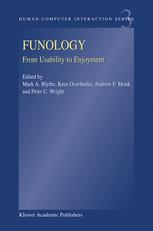

Most ebook files are in PDF format, so you can easily read them using various software such as Foxit Reader or directly on the Google Chrome browser.
Some ebook files are released by publishers in other formats such as .awz, .mobi, .epub, .fb2, etc. You may need to install specific software to read these formats on mobile/PC, such as Calibre.
Please read the tutorial at this link: https://ebookbell.com/faq
We offer FREE conversion to the popular formats you request; however, this may take some time. Therefore, right after payment, please email us, and we will try to provide the service as quickly as possible.
For some exceptional file formats or broken links (if any), please refrain from opening any disputes. Instead, email us first, and we will try to assist within a maximum of 6 hours.
EbookBell Team

4.3
38 reviewsThis book reflects the move in Human Computer Interaction studies from standard usability concerns towards a wider set of problems to do with fun, enjoyment, aesthetics and the experience of use.
Traditionally HCI has been concerned with work and task based applications but as digital technologies proliferate in the home fun becomes an important issue. There is an established body of knowledge and a range of techniques and methods for making products and interfaces usable, but far less is known about how to make them enjoyable.
Perhaps in the future there will be a body of knowledge and a set of techniques for assessing the pleasure of interaction that will be as thorough as those that currently assess usability. This book is a first step towards that. It brings together a range of researchers from academia and industry to provide answers. Contributors include Alan Dix, Jacob Nielsen and Mary Beth Rosson as well as a number of other researchers from academia and industry.